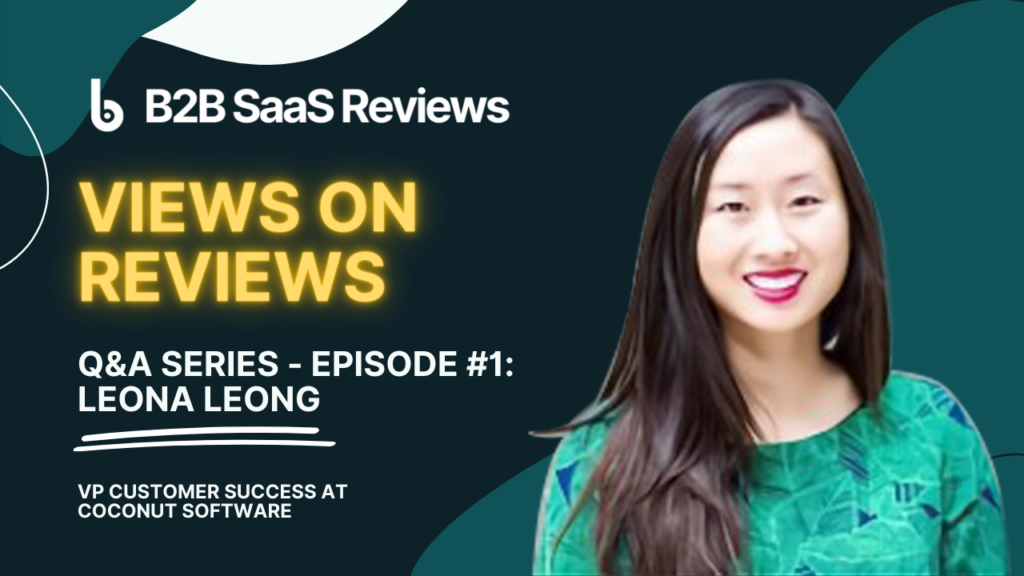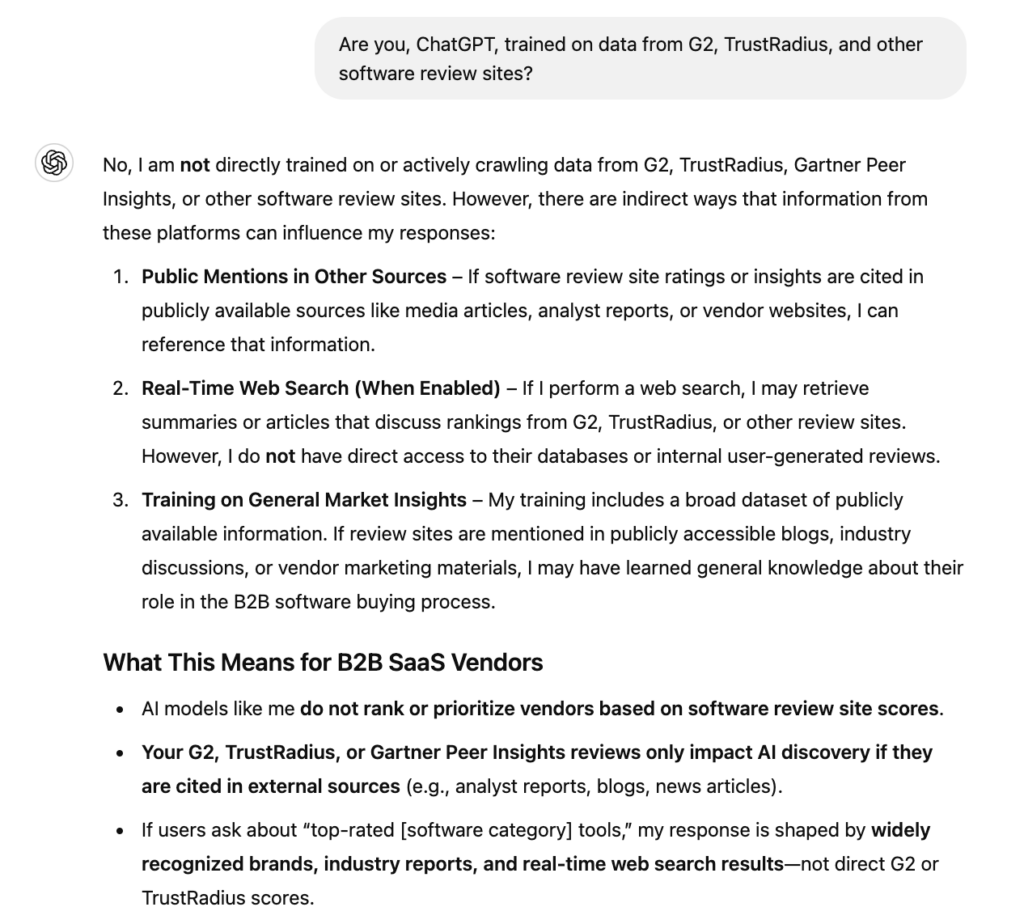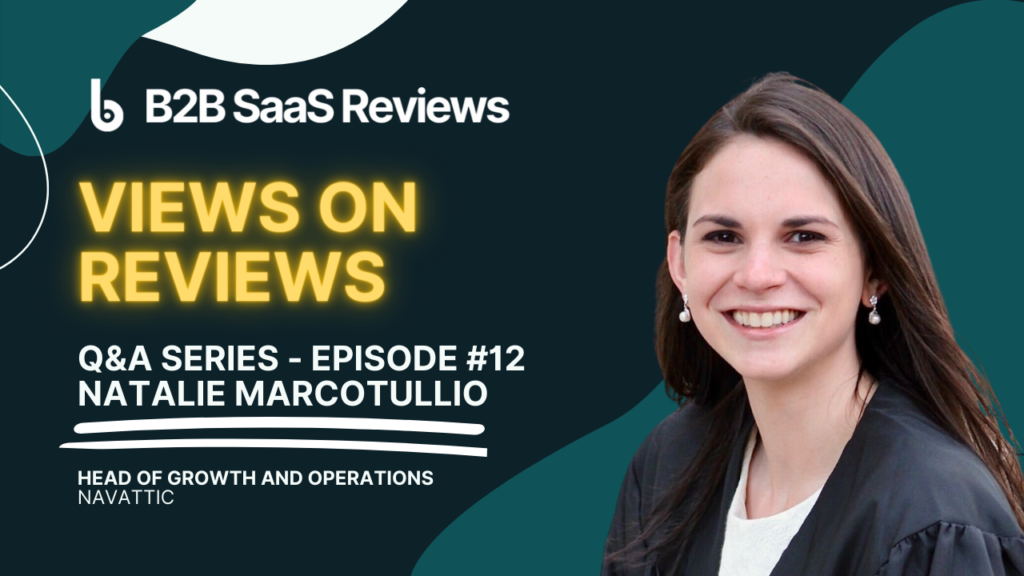Welcome to Views on Reviews, a new series of interviews with B2B SaaS professionals who will provide a real-world perspective on what it’s like working on reviews. My first interview is with Leona Leong, VP Customer Success at Coconut Software. Let’s see how she views reviews.

Leona is the VP of Customer Experience at Coconut Software, the leading provider of appointment scheduling and lobby management solutions for financial institutions. She has over ten years of experience in customer success for B2B SaaS vendors such as Achievers, Topia, and Influitive.
Leona and I worked together at Influitive, the category creator of advocate marketing.
Having worked with Leona, I saw firsthand why she was entrusted with the success of Influitive’s biggest customers. Sharp, focused, and curious, she won an Influitive Hero Award because she’s known as:
- “A force of nature—it’s like she doesn’t stop.”
- “A driven and smart performer full of grit.”
- “Leona is amazing! She can do it all…her customer-centric approach and commitment to our success made her an extended member of our team!”
- “Leona is clear and honest…any company would be lucky to have Leona.”
We’re lucky to have Leona provide her views on reviews in B2B software.

1. How did you get into B2B SaaS?
Answer: Do you want the real reason or the Leona’s interviewing for a job reason 😉 ? I always feel bad about the real reason because of how many folks are trying to enter into the SaaS industry now but… here it goes. I got into B2B SaaS because I graduated as we were entering out of the recession and no bank, CPG, big corporation, etc. wanted to hire me (batted a 0 interview out of 100+ resume submissions). I ended up getting one interview which I luckily did not bomb and joined a very small company called I Love Rewards (most y’all will now know them as Achievers) when they were 60 people big and well here I am.
2. What drew you to a career in Customer Success?
Answer: Oh boy, two back-to-back questions that I’m always embarrassed to answer… I started in SaaS as a sales coordinator supporting the sales team on their decks, demo sites, travel and meeting arrangements etc. I ended up in CS primarily because the CS team at Achievers was always travelling to meet their customers. As a bright-eyed, bushy-tail 22-year-old who really wanted to work abroad, the idea of going on a work trip to Calgary in the dead of winter really appealed to me somehow. So when the time came, and they needed someone new on the CS team, I raised both hands. Fast forward to a decade+ later, multiple global customer onsites, and a silver status tag from Air Canada, work travel is less appealing, but what’s kept me in CS is the people. I genuinely love working with customers and understanding their corporate strategy and how software can help drive them towards their strategic goals. I am very lucky and very privileged to have stumbled into a fulfilling career that keeps me on my toes. I would also like for Air Canada to give me back my silver status if they are reading this. Call me!
3. Let’s get to reviews. You’re in Customer Success. Your colleagues in Marketing typically own user reviews, yet they probably rely on you and your team to get reviews. What does Customer Success want from Marketing when it comes to reviews?
Answer: I’m going to take this question from a different angle. The CS team is often the main conduit to the customer and because of that, a CSM can be juggling multiple requests from folks in their company for things such as getting beta testers, product feedback, customer calls, validating a value prop, , etc. and not to mention multiple external requests they get. What I’ve seen with reviews is that it often comes as a tactical request. In other words, someone from marketing pings the team asking to help drive up reviews on a (third-party review) website. CS Professionals innately want to help others but the challenge is getting the team to prioritize the ask among others. What would help drive this ask is understanding how this fits into the greater strategy of the organization, why it’s important to our customers that we have online reviews (validates us and their choice in the market), why it’s important to the CSMs that there are online reviews (helps us confirm our value prop and shape our narrative that then is used in our conversations with customers), what happens if we don’t have enough reviews (company is at a disadvantage in the market). All this will help a CSM team prioritize the requests and position to customers why we’re asking them for this.
4. Which review sites have you asked your customers to provide reviews on? Any differences on the review sites to note?
Answer: I’ve asked customers to post on Capterra, G2 Crowd, TrustRadius, Gartner and PeerSpot. So your second question here is a funny one. I’ve been asking customers to write reviews for 5+ years now, have logged into those sites as an admin, and even worked at a customer advocacy company that focused on driving reviews yet I cannot tell you the difference between each site if my life depended on it other than Gartner. Marketing should consider adding that as part of their overall strategy of educating internal stakeholders what each review site does and their value prop. There. There is your disconnect. We have no idea what each site does.
5. When do you ask a customer for a review?
Answer: We typically ask after an NPS response. I don’t think it’s super effective but it is a quick, low-touch way of asking. One of my favourite quotes that I read from an interview with Shannon Katschilo is, “People buy with emotion and backfill with logic.” When I think of when to ask a customer for a review, especially in a B2B world, I think it shouldn't be centred around a software milestone or timing but more around an emotion that was created - after a killer customer call, an executive business review that went well, a fun customer event, or feature release that they’ve been wanting.
6. What helps customers write reviews?
Answer: The right expectations on how long it will take, guidance on what you like them to focus on given how they use your solution or the type of relationship they have with your company, and examples of well-written reviews. I would also strongly encourage customers to be honest. As much as marketing and the CS team would love a positive review, be transparent of what could be better. Reviews are so prevalent in any industry now and anyone can smell an inauthentic review. At a minimum, as a CSM, at least you’re getting feedback straight from the horse’s mouth that you can take back internally and address.
7. You’ve been asking customers to write reviews for 5+ years now. What have been some of the common responses from your customers on the review request?
Answer: Usually, if and when I ask a customer to write a review, I'm 90% confident they would (unless this is part of a scaled marketing blitz) and I would have upfront given them the spiel (the why, how long, etc. etc). The response back from the customer would be one of the following a) I need to check with legal if I can do this b) yes, love to or c) no response. I'll usually follow up 1-2 more times after no response and then will drop it and run a quick mental scan of if I should read into this more against all the other datapoints I have on the customer.
8. What advice do you have for B2B SaaS vendors who want to get more reviews?
Answer: Personally, I think this needs to be a corporate goal - whether annually or objectively - and tied into the team’s OKRs. When the goal is being reviewed at a higher level than say a Customer Marketing Manager or Marketing team, and it’s looked at on the leadership level, it creates a sense of camaraderie and ownership across the board. I recognize this isn’t an easy thing to do to add reviews as a corporate goal but I’m actually surprised more and more companies don’t do it. When done right and the organization mobilized behind it, reviews can be a low-hanging fruit to accomplish and baked into the behaviors of a team that has an impact on the greater sales cycle, retention strategy, and roadmap development.
9. How do you think CS could use buyer intent data from review sites?
Answer: One of the areas we often don’t leverage but should as CSMs is signing up for our company’s review site (buyer intent data) and tracking when our customers are looking at other vendors. This was something I did as an Enterprise CSM alongside my Account Executive counterpart to swarm and expand a customer and get deeper into the overall relationship of that organization. Not to mention it gives you a signal for existing customers that may be exploring different pastures - better to know than be surprised. A surprised CSM is an unhappy CSM.
10. Are you seeing any change with where you or your CS peers go for user reviews? i.e. not to review sites, but to your own personal network directly, or to peer networks (like in the CS in Focus Slack Community, do people ask about software in there? E.g. “Hey, I’m looking into to Acme Software. Has anyone used it? Would love your take” and then people reply in a thread?)
Answer: Oh 100%. When I'm evaluating software, I go to my network via direct messages or communities to ask for feedback and set up 1:1 time with folks than reading reviews. I'm trying to source references and feedback from folks that are in the similar size, stage, and have the same goals as me for their take on the product than looking at review sites which could be a mix bag of use cases. I see review sites being more for earlier on research of what products are out there and asking network as more late stage sales cycle. I think marketers call this a TOFU vs BOFU? Did I use these terms right? (Yes, yes you did :))
11. Who do you consider an expert in reviews (i.e. who would you recommend people turn to with questions on reviews for a B2B SaaS vendor)?
Answer: Kiely Montiero for creating review campaigns at scale that includes an authentic touch. I also got an opportunity to be exposed to some amazing customer marketing professionals that taught me how to create review campaigns that work including Shristi Shonka and Cristina Melluzzi. These two leaders aren’t ones to boast publicly about what they’ve accomplished but getting to work alongside them really shaped my understanding of running an effective review strategy and how it fit into the greater vision. Knowing these two amazing leaders, they are also going to tell you that it was their team that are the true experts and did all the work. I’ll just say it for them.
Key Takeaways:
- Marketers, share your review strategy with Customer Success to help them understand how it will help make the organization more successful. Also, share which business software review sites you’re prioritizing and why.
- Ask for a review after you and your customer share a positive experience, such as an executive business review that went well or a fun customer event.
- Follow up once or twice if you don’t get a response to your review request.
- CSMs, ask your Marketing team if and how you can leverage review site buyer intent data to keep a pulse on your accounts with upsell and cross-sell opportunities or churn risk.
- Reviews can help increase sales, improve retention, and feed product development.
- Set reviews as a corporate goal and tie it into the team’s OKRs. This elevates it to the leadership level, and creates a sense of camaraderie and ownership across the board.
To contact Leona, please message her on LinkedIn.
If you’d like to share your experience generating, leveraging, or measuring B2B SaaS reviews, please email me: joe@b2bsaasreviews.com
References:
Leona referenced a quote, and a few people in her responses. Here’s the link to the post with the quote, and links to the LinkedIn profiles of the people she mentioned.
Authors
-

I'm the Founder and Editor-In-Chief of B2B SaaS Reviews and the Director of Demand Generation at PartnerStack, the leading platform for partner management and affiliate marketing in B2B SaaS. My experience spans several notable B2B SaaS companies, including Influitive (Advocate Marketing), LevelJump (Sales Enablement, acquired by Salesforce), and Eloqua (Marketing Automation, acquired by Oracle). I hold a Bachelor of Commerce in Marketing Management from Toronto Metropolitan University and a Master of International Business from Queen's University, with academic exchanges at Copenhagen Business School and Bocconi University.
-





